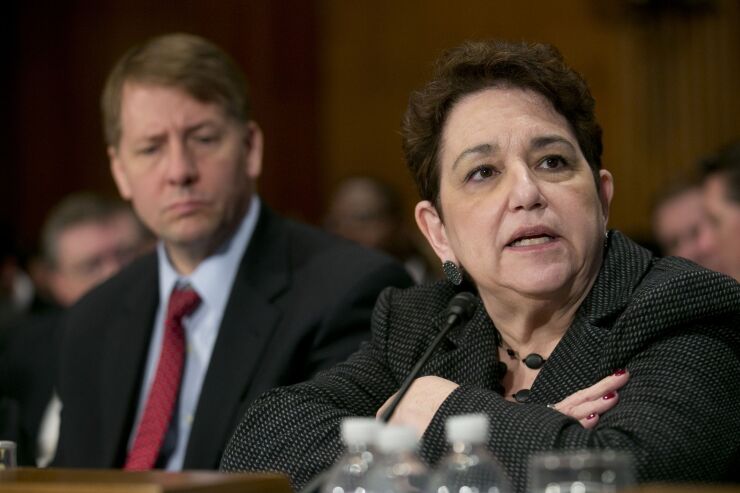State and local governments will have to deal with many unknowns as 2020 wraps up, and figure out how to disclose pandemic concerns as conditions deteriorate for vulnerable credits, experts said at a Securities and Exchange Commission’s Fixed Income Market Structure Advisory Committee meeting Monday.
FIMSAC met Monday to discuss various issues facing issuers.
Former SEC Chair and Commissioner Elisse Walter said FIMSAC needs to keep an eye on market structure to see if any changes need to be made to make the market function better, she told fellow members.
“We need to continue to have an eye on transparency and whether or not there are further routes that should be taken in mind, particularly with respect to pre-trade transparency to help investors in this market,” Walter said.
In regards to all types of fixed income, the committee needs to look at regulatory disparities between broker-dealers and alternative trading systems, Walter said. FIMSAC began taken those steps after approving a preliminary recommendation asking for a consistent definition of “electronic trading” and an industry standard for reporting “electronic trading volumes” on Monday.
The committee said there was no consistent standard for publicly reporting trading volumes across the 20 trading platforms currently trading corporate and municipal bonds. Volumes are reported inconsistently and make it harder for analysts to interpret, they said.
Some inconsistencies include reporting venue practices that don’t distinguish between trades that are fully electronic versus processed. Fully electronic trades are those in which all material interactions between the parties to the trade occur through the platform. Processed trades are trades where counterparties negotiate price and other terms away from the venue, but then submit the trade to a venue.
“I understand and support the desire for enhanced transparency,” SEC Chair Jay Clayton said in his written remarks. “Generally, markets and market participants benefit from accurate and consistent trading data, to find liquidity and make investment decisions. I appreciate the Committee’s attention to this important matter.”
This recommendation is related to an SEC concept release from last week. The SEC asked for comment on whether the current regulatory structure for alternative trading systems needs to be changed.
Major broker-dealer groups plan to comment on that release.
Meanwhile, Suzanne Shank, chair, chief executive officer and co-founder of Siebert Cisneros Shank & Co. LLC and member of the committee told members said she expects continued volatility as the year rounds out.
“We anticipate volatility to continue and to stall as municipal issuers really grapple with budgetary distress, which will hinge on news around vaccine developments and other stimulus package passages, if there is one with aid to state and local governments,” Shank said. “Of course, if there is any disruption surrounding the election results, we would expect that to contribute to volatility.”
Lawmakers have yet to pass another relief bill, and it is becoming less likely as election season nears. House Democrats approved a $2.2 trillion HEROES Act late last week without Republican support. It would include $436 billion in direct state and local aid.
Over the next few months, there will be a wider difference between the “haves and have-nots,” Shank said. Issuers with robust rainy day funds will be better positioned compared to challenged credits that hinge on hospitality, which will continue to struggle, she said.
Issuers are also grappling with how much to disclose because they are dealing with a lot of unknowns, Shank said.
The Municipal Securities Rulemaking Board tracks the number of COVID-19-related disclosures and publishes that data on a weekly basis.
To date, state and local government issuers have filed over 20,000 disclosures with the MSRB that reference the pandemic, said Mark Kim, FIMSAC member and MSRB CEO.
Many stakeholders have wondered in actuality how many issuers have submitted the disclosures.
Based on using the base CUSIP as a proxy, Kim said they found about 12,600 issuers had submitted disclosures that referenced COVID-19 to date. The muni market has over 50,000 municipal issuers total.
“If you take that universe of all the distinct CUSIP-6’s that have traded in 2020, approximately 40% of those CUSIPs have a COVID-19 related disclosure associated with it,” Kim told FIMSAC members.
CUSIP-6 identifies the bond issuer.

The Bond Dealers of America believe reasonable efforts to improve the clarity and transparency of trade reports are welcome, such as the recommendation approved Monday.
The American Securities Association said the recommendation will help more trading venues register and be under the SEC’s supervision.
SEC commissioners also voiced their support to extend FIMSAC’s term to March 2021 during the meeting Monday.





